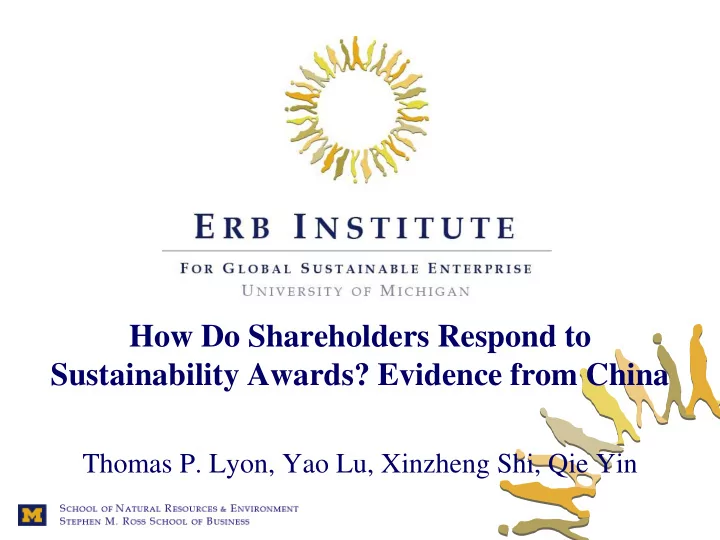

How Do Shareholders Respond to Sustainability Awards? Evidence from China Thomas P. Lyon, Yao Lu, Xinzheng Shi, Qie Yin
Greening China • China has become the world‟s largest emitter of GHGs • But it is also the world‟s largest producer of PV panels, has almost as much installed renewable energy as the US, and is the world‟s largest investor in clean energy. • Its 12 th Five-Year Plan sets many goals that will continue to move the country forward in energy efficiency and renewables. • How is the private sector responding to this complex set of forces? • We seek evidence in how the stock markets responded to companies that won green awards.
Annual Summit of China Green Companies
Environmental News and Shareholder Value • TRI Releases: Bad news hurts – Hamilton (1995), Konar and Cohen (1997), and Khanna et al. (1998) found negative ARs for US firms with high TRI releases. • Green Awards: Good news helps – Klassen and McLaughlin (1996) found positive ARs for US firms that received green awards, especially for firms in cleaner industries. – Dasgupta, Laplante and Mamingi (2001) found positive ARs for firms that received awards in Argentina, Chile, Mexico and Philippines. • Green Ratings: Bad news hurts, good news may help – Gupta and Goldar (2005) found large negative abnormal returns for Indian firms in dirty industries that received poor ratings from the Green Ratings Project. – Beatty and Shimshack (2010) found that US firms rated poorly by Climate Counts received negative ARs. – Lyon and Shimshack (2011) find that US firms rated in the Top 100 by Newsweek received more positive ARs than those in the Bottom 400.
Our Research Questions • How did shareholders respond to the news that Chinese companies had received environmental awards? – China Green Companies awards – Baogong Environmental Awards • How did the response depend upon firm- specific factors?
Basic Event Study Methodology 1. Identify the event of interest and define the event window 2. Select the sample used for analysis 3. Predict a „„normal‟‟ return during the event window in the absence of the event a) Market model b) CAPM 4. Estimate the “cumulative abnormal returns” (CARs) within the event window 5. Test whether the CAR is statistically different from zero. 6. Assess determinants of abnormal returns
Initial Results and Robustness • Abnormal returns to winners in the aggregate are consistently negative and sometimes significant. • Questions – Is China‟s stock market sufficiently developed to be reliable? • Compare against returns for firms listed on Hong Kong exchange or NYSE – Are the green awards credible? • Drop 3 firms that received low scores from Rankins CSR ratings – Can we gain additional insight by incorporating firm- specific factors? • Size, pollution, SOE, political connections, ROA
Results Are Not Driven by Firms with Low CSR Rankings
Firms in clean industries received negative CARs
Private firms received negative CARs
Multivariate Analysis • We have examined individual factors that affect returns, but it is also of interest to explore their joint impact. • We regressed CARs on several factors, including: – Heavily-polluting industry – Size (Top 50%) – SOE (State is largest shareholder) • Overall findings: smaller firms in cleaner industries were hurt by the awards.
Conclusions • In China, it seems that “good news hurts.” – There is no evidence that green awards led to increased shareholder returns. • For smaller firms in cleaner industries, the awards led to negative abnormal returns • Suggests that investors still view environmental issues as the government‟s responsibility, and not that of the private sector. – For big dirty firms, green awards are neutral. – For small clean firms, green awards show firms are wasting resources.
Recommend
More recommend